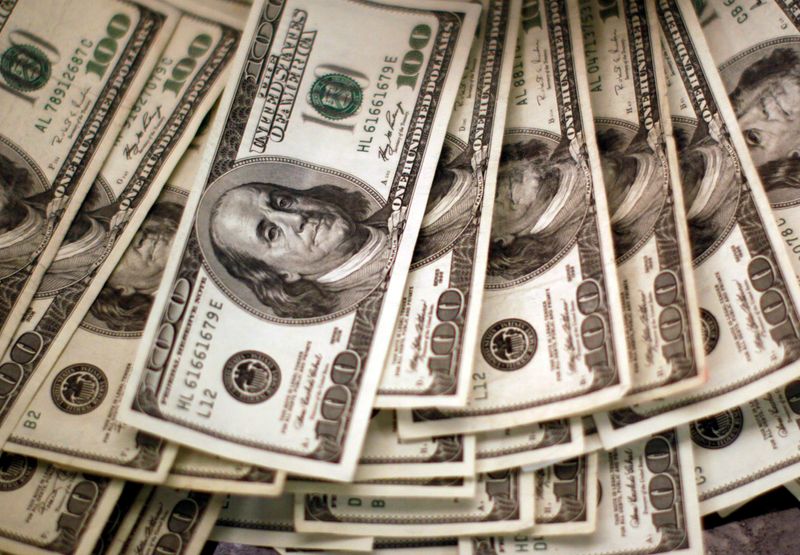By Chris Taylor
NEW YORK (Reuters) - You might assume that with U.S. interest rates at new highs, Americans are getting terrific returns on savings.
You assume wrong.
In fact, while the Federal Reserve raised the Fed funds target rate to 5-5.25%, the average yield for savings accounts is still a miniscule 0.25%, according to the most recent survey from financial information website Bankrate.com.
That massive spread is great for the banks – and terrible for savers.
So what is going on?
“Even though the Federal Reserve has raised interest rates at the fastest pace in 40 years, you would never know it if you have your savings sitting in the wrong place,” said Greg McBride, Bankrate’s chief financial analyst.
The good news – and there is good news – is that there are actually multiple places where you can stash your cash, and obtain yields in the region of 4-5% with minimal risk.
In other words, there is no excuse to accept paltry payouts. But you have to do the leg work: Find out the rate your bank is giving you, research alternatives and “send your money where it is going to be welcomed with open arms and higher returns,” McBride said.
A few thoughts on the best places to park cash now.
HIGH-YIELD SAVINGS
Just because one bank is offering an insulting 0.25% (or even less), does not mean all of them are. Current offers include 4.5% from institutions like Synchrony, BMO and TIAA Bank, according to Bankrate.
Perhaps you are nervous about offers from lesser-known online banks, given the recent failures of regional institutions like SVB. But just remember that such products are FDIC-insured up to $250,000 per depositor, per insured bank (meaning you could have multiple such accounts spread around, and that money would never be in danger).
T-BILLS
If you are seeking an extremely low-risk investment, Treasury Bills are an obvious solution – short-term debt backed by the U.S. government. They are sold in occasional auctions, in terms ranging from four weeks to a year, which you can purchase by setting up an account at
“It is almost a no-brainer to stash cash in T-Bills in this environment,” said James Gambaccini, a financial planner in Reston, Virginia.
Gambaccini recently purchased T-Bills for a client with a 5.3% annual yield, fully guaranteed and fully liquid.
"One can simply keep rolling these," Gambaccini said. "These are also taxed less than money market funds, savings or CDs.”
CERTIFICATES OF DEPOSIT
If you will not need your cash for a period of time – perhaps you are saving up for a down payment on a home in a couple of years – then CDs might make sense. Just take a look at the eye-catching rates now: 4.9% from Sallie Mae, 4.8% from Barclays (LON:BARC), and 4.75% from Capital One, all for one-year CDs.
Remember that many CDs require investment minimums, and that your money is essentially locked up for a while. Getting it out early could mean sacrificing that interest or paying penalties.
MONEY MARKET FUNDS
In brokerage accounts there is a default or "sweep" account, where cash is kept before you make other investments. The nice surprise is that these accounts – which invest in high-quality, short-term debt – are offering generous payouts of their own these days.
The two highest yields at the moment for government money market funds, according to data trackers iMoneyNet: UBS Liquid Assets Government Fund at 5.07%, and Vanguard Treasury Money Market Fund at 5.06%.
Keep in mind that while risk here is very low, it is not zero. In times of extreme market turbulence, like the financial crisis of 2008-09, there is the possibility that such funds could “break the buck” and fall below the normal value of $1 per share.
An important note about terminology: Money market funds are distinct from money market accounts. The latter are banking products, a form of high-yield savings that enjoy FDIC insurance – and can also be a smart place to keep cash.

Whichever route you choose, the key point is to shake yourself out of the notion that where you keep your cash does not matter all that much. These days, at these rates, it can matter very much indeed.
“Short-term yields are finally worth talking about,” said Brandon Opre, a financial adviser in Huntersville, North Carolina. “All of these are very appealing, and we are recommending people reassess their cash and emergency fund savings. In many cases, they should be getting more bang for their buck.”